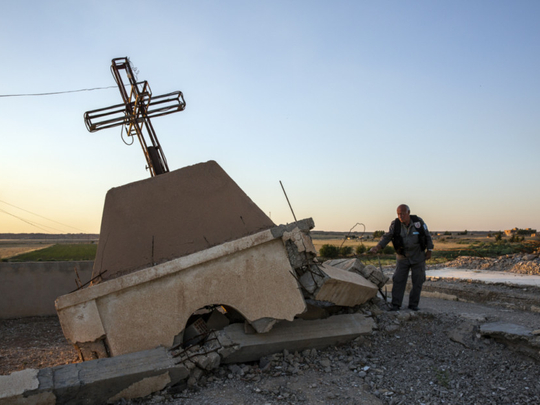
Tel Tal, Syria: The memories of the retired oilman dot the village in Syria where he grew up. The mud chapel he got married in. The concrete church he helped build that would overflow with worshippers on holidays.
The tight community of Assyrian Christian families who had lived together in this area for generations.
Now it’s a village of ghosts.
The church is a pile of rubble, its bell tower and its cross toppled over like a felled tree.
The dirt paths are overgrown, walked by stray dogs.
Most homes are empty, their owners in Germany, Australia, the United States and elsewhere.
“All the houses used to be full,” said the oilman, Ishaq Nisaan, 79.
“Now on my street, it’s only me and my neighbor.”
The same fate has befallen all the surrounding villages, where Assyrian Christians, one of Syria’s many religious minorities, had long farmed and raised animals along the banks of the Khabur River in the country’s northeast.
Daesh attacked the area in 2015, kidnapping more than 220 residents.
The terrorists were pushed out a few months later by Kurdish forces and local fighters, and released most of the captives after receiving exorbitant ransoms.
But the extremists demolished many of the area’s churches before they left, and almost all of the freed captives, along with their families and neighbors, have since fled, hollowing out the community.
“Life here is very nice, but there are no people,” said Ramina Noya, 23, a member of the local council governing the area.
She stayed, but most of her relatives are in the United States.
Seven years of war in Syria have displaced half the country’s population and sent millions of refugees abroad.
As the government of President Bashar Al Assad reclaims more territory from the rebels who sought to oust him, some people may return.
But other vulnerable communities, like the one here in Tel Tal, were so traumatised that they may never recover, leaving permanent holes in Syria’s social fabric.
The number of Christians across the Middle East has declined for decades as persecution and poverty have led to widespread migration.
Daesh considered Christians infidels and forced them to pay special taxes, accelerating the trend in Syria and Iraq.
In this area of Syria, the exodus has been swift.
Some 10,000 Assyrian Christians lived in more than 30 villages here before the war began in 2011, and there were more than two dozen churches.
Now, about 900 people remain and only one church holds regular services, said Shlimon Barcham, a local official with the Assyrian Church of the East.
Some of the villages are entirely empty.
One has five men left who protect the ruins of the Virgin Mary Church, whose foundations the terrorists dynamited. Another village has only two residents - a mother and her son.
Barcham doubted that many people would return.
“They all say nice things about wanting to come back, but I don’t think they will,” he said.
Who are the Assyrians?
Assyrians are an indigenous Middle Eastern minority who trace their roots to the ancient Assyrian empire.
Their main modern communities are in Iran, Iraq, Syria, Turkey and a few Western countries.
They belong to a number of churches, including the Assyrian Church of the East and the Chaldean Catholic Church, and they speak a dialect of Aramaic.












